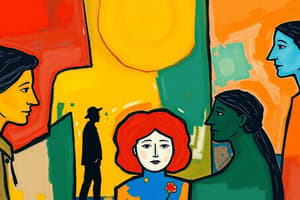Podcast
Questions and Answers
What is symbolic interactionism primarily focused on?
What is symbolic interactionism primarily focused on?
- Social interaction in the classroom (correct)
- Global citizenship education
- Political participation in elections
- Formal school curriculum development
Which concept emphasizes active participation in community affairs?
Which concept emphasizes active participation in community affairs?
- Active citizenship (correct)
- Passive citizenship
- Social isolation
- Civic disengagement
According to the concept of citizenship in ancient Athens, what is one of its essential dimensions?
According to the concept of citizenship in ancient Athens, what is one of its essential dimensions?
- Isolation from community
- Practice of active participation (correct)
- Indifference to government
- Economic status only
What does a maximal concept of democracy emphasize?
What does a maximal concept of democracy emphasize?
How does citizenship education in South Africa aim to prepare learners?
How does citizenship education in South Africa aim to prepare learners?
What role do companies and organizations have in active citizenship?
What role do companies and organizations have in active citizenship?
Which of the following is NOT a dimension of citizenship based on Pericles’s affirmation?
Which of the following is NOT a dimension of citizenship based on Pericles’s affirmation?
What is cosmopolitanism primarily about?
What is cosmopolitanism primarily about?
What does the concept of diversity primarily refer to?
What does the concept of diversity primarily refer to?
Which of the following is NOT considered a source of diversity?
Which of the following is NOT considered a source of diversity?
Which social factor is NOT mentioned as influencing group identity?
Which social factor is NOT mentioned as influencing group identity?
Which of the following best describes culture according to Ferrante?
Which of the following best describes culture according to Ferrante?
Which elements are included in the study of culture?
Which elements are included in the study of culture?
What does culture pass on to new generations?
What does culture pass on to new generations?
In some societies, who plays a significant role as advisors?
In some societies, who plays a significant role as advisors?
Which statement about social institutions is FALSE?
Which statement about social institutions is FALSE?
What is the primary focus of macro level sociological research?
What is the primary focus of macro level sociological research?
Which theory emphasizes conflict and social change?
Which theory emphasizes conflict and social change?
What concept reflects specialization in modern, industrialized society?
What concept reflects specialization in modern, industrialized society?
What do manifest functions refer to, according to Robert Merton?
What do manifest functions refer to, according to Robert Merton?
Which author is associated with functionalism?
Which author is associated with functionalism?
What aspect is emphasized by symbolic interactionism?
What aspect is emphasized by symbolic interactionism?
Which of the following is NOT a characteristic of functionalism?
Which of the following is NOT a characteristic of functionalism?
What does mechanical solidarity refer to?
What does mechanical solidarity refer to?
What does the Bill of Responsibilities emphasize for South African learners?
What does the Bill of Responsibilities emphasize for South African learners?
Which cornerstone of Brighouse’s Bill of Responsibilities focuses on national pride?
Which cornerstone of Brighouse’s Bill of Responsibilities focuses on national pride?
What does cosmopolitan citizenship promote among South African learners?
What does cosmopolitan citizenship promote among South African learners?
In the context of sociology, which aspect most significantly shapes identity?
In the context of sociology, which aspect most significantly shapes identity?
What is the definition of diversity?
What is the definition of diversity?
Which of the following best defines culture?
Which of the following best defines culture?
What role does socialization play in society?
What role does socialization play in society?
Which factor does NOT contribute to social class divisions?
Which factor does NOT contribute to social class divisions?
What are ascribed characteristics typically attributed to?
What are ascribed characteristics typically attributed to?
What defines an open class system in social stratification?
What defines an open class system in social stratification?
How do Functionalists view gender roles in society?
How do Functionalists view gender roles in society?
What is one characteristic of a caste system?
What is one characteristic of a caste system?
What distinguishes sex from gender?
What distinguishes sex from gender?
According to Conflict Theory, gender differences are viewed as a reflection of what?
According to Conflict Theory, gender differences are viewed as a reflection of what?
Which of the following is classified as an achieved characteristic?
Which of the following is classified as an achieved characteristic?
What do symbolic interactionists believe about gender?
What do symbolic interactionists believe about gender?
Flashcards are hidden until you start studying
Study Notes
Sociological Approaches to Education
- Macro-level focuses on societal structures and their impact on education.
- Examines long-term processes like the development of modern societies
- Investigates how variations in school practices influence student performance.
- Micro-level focuses on individual interactions and their influence on education.
- Examines how societal forces like economics and politics shape schools.
- Investigates everyday situations in school, family, and work settings.
Theories of Sociology of Education
- Functionalism (macro) emphasizes social order and consensus.
- Key concepts: social systems, socialization, norms and values, manifest and latent functions.
- Conflict Theory (macro) emphasizes conflict, change, and inequality.
- Key concepts: social class, power, inequalities.
- Symbolic Interactionism (micro) focuses on individual interactions and meaning-making.
- Key concepts: capacity for thought, meaning, interaction, interpretation, self and agency.
Key Concepts in Functionalism
- Mechanical Solidarity: Society held together by shared beliefs and values (common in traditional societies).
- Organic Solidarity: Society held together by specialized roles and interdependence (common in modern societies).
- Manifest Functions: Intentional and obvious consequences of an action (e.g., teaching skills relevant to the workplace).
- Latent Functions: Unintentional and less obvious consequences of an action (e.g., learning to distinguish personal values from institutional values).
Key Concepts in Symbolic Interactionism
- Symbolic interactionists view social interaction as crucial in shaping individuals and society.
- They believe individuals interpret and act based on the meaning they assign to objects and people.
- This theory highlights how classroom interactions influence gender socialization.
Citizenship Education
- Citizenship Education aims to prepare learners to act locally and think globally.
- It encompasses active community engagement beyond the formal curriculum.
- Democracy involves citizens participating in decision-making processes and running affairs.
- Active Citizenship emphasizes the responsibilities of individuals and organizations to society and the environment.
- Cosmopolitanism advocates for a global community where all humans belong.
Ancient and Modern Concepts of Citizenship
- Ancient Greek citizenship emphasized status, feeling of belonging, and active participation.
- Pericles emphasized the interconnectedness of personal and public dimensions of citizenship.
- Modern concepts also encourage active participation in local, national, and international affairs.
Bill of Rights and Bill of Responsibilities
- Bill of Rights: Enshrines fundamental rights of individuals and democratic values.
- Bill of Responsibilities: Outlines the duties and responsibilities of citizens to themselves and others.
- Brighouse's Four Cornerstones of a Bill of Responsibilities:
- Reminds learners of their obligations to themselves and classmates.
- Promotes a sense of belonging and national pride.
- Encourages good and responsible citizenship.
- Aims to bring prosperity and secure individual liberties.
Diversity in Education
- Diversity: Refers to the unlikeness and differences among people.
- Culture: Refers to the shared ways of life, beliefs, values, and practices of a group.
- Social Class: Refers to the division of society based on economic status, power, and prestige.
Sources of Diversity
- Identity: Shaped by factors like race, gender, class, religion, and disability.
- Gender: Refers to the social and cultural expectations associated with being male or female.
- Race: Refers to categories based on shared physical characteristics, history, culture, and economics.
Culture and its Elements
- Culture is a complex system of shared beliefs, values, and practices that shape a group's way of life.
- Elements of culture: Dress, food, language, religion, sports, and dance.
- Traditional definitions: Culture as cultivation and tradition.
- Cultural symbols: Used to communicate shared meanings and values.
- Culture and power: Cultural practices and beliefs can be distributed along lines of power.
Social Stratification
- Social Stratification: Refers to the ranking of individuals and groups within a society based on factors like wealth, status, and power.
- Ascribed characteristics: Traits assigned at birth, for example, skin color, sex.
- Achieved characteristics: Traits acquired through effort and choice, for example, education level, profession, and income level.
Key Points of Stratification
- Caste System (Closed): Ascribed characteristics determine social position for life.
- Class System (Open): Individuals can move up or down the social hierarchy based on merit and achievements.
Gender and its Social Construction
- Sex: Biological and anatomical differences distinguishing males and females.
- Gender: Socially constructed differences in roles, behaviors, and identities assigned to males and females.
- Sociologists' Views on Gender:
- Functionalist: Gender differences contribute to social stability.
- Conflict Theory: Gender inequality reflects power imbalances.
- Symbolic Interactionist: Gender is constructed and reproduced through social interactions.
Studying That Suits You
Use AI to generate personalized quizzes and flashcards to suit your learning preferences.




